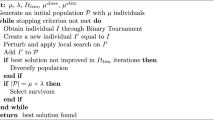Abstract
The paper deals with a permutation flow-shop problem where processing times of jobs on some machines are linear, decreasing functions with respect to the amount of continuously-divisible, non-renewable, locally and totally constrained resources, e.g. energy, catalyzer, raw materials, etc. The purpose is to find a processing order of jobs that is the same on each machine and a resource allocation that minimizes the length of the time required to complete all jobs, i.e. makespan. Since the problem is strongly NP-hard, some heuristic algorithms of a genetic type were applied to solve it. These algorithms strongly employ some substantial problem properties, which were proved. The results of some computational experiments are also included.
Similar content being viewed by others
References
S. Baghi et al., Exploring problem-specific recombination operators for job shop scheduling, in: Proc. 4th Int. Conf. on Genetic Algorithms, Morgan Kaufmann, San Mateo, CA, 1991, pp. 10–17.
K.R. Baker, A comparative study of flow-shop algorithms, Oper. Res. 23(1975)62.
J.E. Biegel and J.J. Davern, Genetic Algorithms and job shop scheduling, Computers Ind. Engng. 19(1990)81–91.
H.G. Campbell, R.A. Dudek and M.L. Smith, A heuristic algorithm for the n-job, m-machine sequencing problem, Mgmt. Sci. 16(1970) B6 30–B6 37.
G.A. Cleveland and S.F. Smith, Using Genetic Algorithms to schedule flow shop releases, in: Proc. 3rd Int. Conf. on Genetic Algorithms, Morgan Kaufmann, San Mateo, CA, 1989, pp. 160–169.
D.G. Dannenbring, An evaluation of flow-shop sequencing heuristics, Mgmt. Sci. 23(1977)1174–1182.
L. Davis, Handbook of Genetic Algorithms, Van Nostrand Reinhold, New York, 1991.
L. Davis, Job-shop scheduling with genetic algorithms, in: Proc. Int. Conf. on Genetic Algorithms and their Applications, Lawrence Erlbaum, Hillsdale, NJ, 1985, pp. 136–140.
E. Falkenauer and S. Bouffouix, A generate algorithm for job shop, in: Proc. Int. Conf. on Robotics and Automation, Sacramento, April, 1991.
D.E. Golberg, Genetic Algorithms in Search, Optimization and Machine Learning, Addison Wesley, Reading, MA, 1989.
J. Grabowski and A. Janiak, Job-shop scheduling with resource-time models of operations, Eur. J. Oper. Res. 28(1987)58–73.
H.W. Hamacher and S. Tufekci, Algebraic flows and time-cost tradeoff problems, Ann. Discr. Math. 19(1984)165–182.
J.H. Hohland, Adaptation in Natural and Artificial Systems, MIT Press, Cambridge, MA, 1975.
A. Janiak and J. Grabowski, Minimization of a sequence of operations with resource allocation in discrete manufacturing processes, Scientific Bulletins of Silesian Polytechnics, s. Automatics, No. 54(1980)67–74 (in Polish).
A. Janiak, Minimization of resource consumption under a given deadline in two-processor flow-shop scheduling problem, Information Processing Letters 32(2)(1989)101–112.
A. Janiak, Exact and Approximate Algorithms of Job Sequencing and Resource Allocation in Discrete Manufacturing Processes, Monograph published by Technical University of Wrocław, No. 87/20, 1991 (in Polish).
A. Janiak and T. Szkodny, Job-shop scheduling with convex models of operations, Math. Comput. Modelling 20(2)(1994)59–68.
S.M. Johnson, Optimal two-and three-stage production schedules with setup times included, Naval Res. Logist. Quart. 1(1954)61–68.
J.J. Kanet and V. Sridharan, PROGENITOR: A genetic algorithm for production scheduling, Wirtschaftinformatik 33(1991)4–12.
J. Koza, Genetic Programming, MIT Press, Cambridge, MA, 1992.
G.J. Lageweg, J.K. Lenstra and A.H.G. Rinnooy Kan, A general bounding scheme for the permutation flow-shop problem, Oper. Res. 26(1978)52.
M. Nawaz, E.E. Enscore, Jr. and I. Ham, A heuristic algorithm for the m-machine n-job flow-shop sequencing problem, OMEGA 11(198391–95.
S. Turner and D. Booth, Comparision of heuristic for flow shop sequencing, OMEGA 15(1987)75–78.
S. Uckun, S. Bagchi, K. Kawamura and Y. Miyabe, Managing genetic search in job shop scheduling, IEEE Expert 8(5)(1992)15–24.
F. Werner, On the solution of special scheduling problems, Ph.D. Thesis, Otto-von-Guericke Universität, Magdeburg, 1984 (in German).
F. Werner, An adaptive stochastic search procedure for special scheduling problems, Ekonomicko-Matematicky Obzor 24(1988)50–67 (in German).
D. Whitley, Foundations of Genetic Algorithms 2, Morgan Kaufmann, San Mateo, CA, 1992.
D. Whitley and T. Starkweather, GENITO II: A distributed genetic algorithm, J. Exp. Theor. Artif. Intell. (1990).
Rights and permissions
About this article
Cite this article
Janiak, A., Portmann, MC. Genetic algorithm for the permutation flow-shopscheduling problem with linear models of operations. Annals of Operations Research 83, 95–114 (1998). https://doi.org/10.1023/A:1018924517216
Issue Date:
DOI: https://doi.org/10.1023/A:1018924517216




